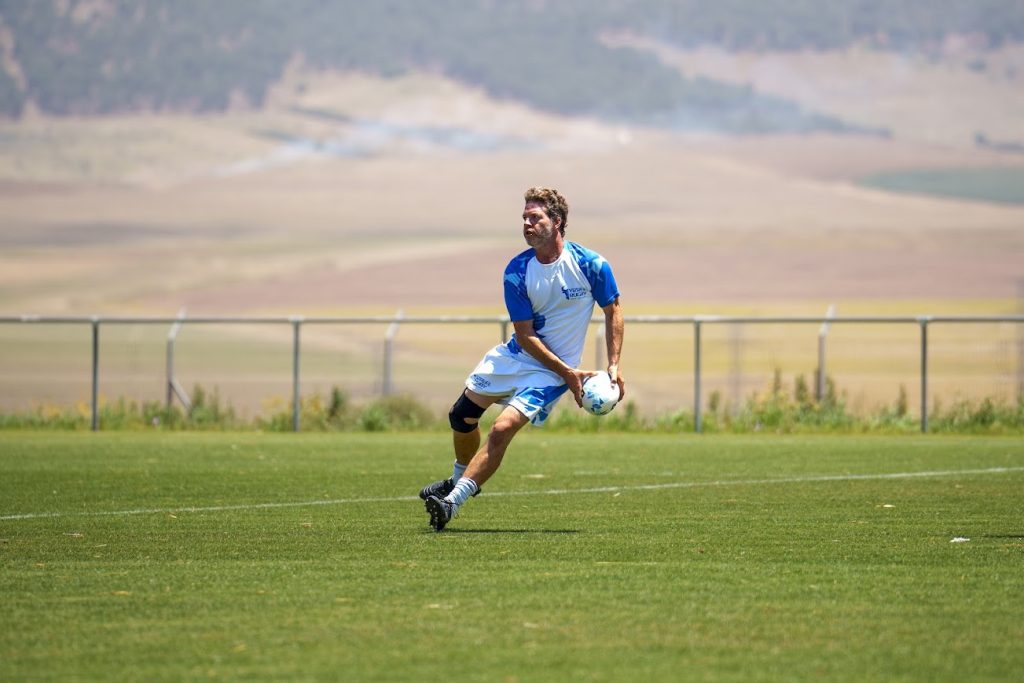The association and clubs are preparing for the season opener amidst the ongoing war and existing challenges. League and Cup manager Amir Beutler is gearing up and optimistic about the future: “We’re in a marathon—it’s not easy, and sometimes we hit walls, but we don’t give up. That’s who we are.”

Legendary Amir Beutler with the Yizrael children’s team
The rugby season opens this week, and if there’s one thing that defines rugby, it’s the ability to overcome any obstacle and the determination to hold a game at all costs. That’s why hosting a tournament instead of scored league games last season was an unusual and rare event, one that even “defeated” the COVID-19 pandemic, which paralyzed the world but not Israeli rugby.
Amir Beutler, the League and Cup manager, promises—and then corrects himself, saying he hopes—that the season will go as planned. “There will certainly be bumps along the way, but we’re all in the same boat, and we all want to play rugby.”
The determination and persistence to play at all costs is especially impressive in a sport without high-value contracts or superstar players. There’s a genuine passion for the game here. “That’s why they introduced GOV—Game-On Variations into rugby,” Amir explains, adding, “You play at any cost, and if needed, you adapt the game to the conditions.”
And so it was last season: with many players called up for reserve duty, a prominent club evacuated from its home (Galilee), frequent sirens at another club’s field (Haifa), and, overall, an unsettling wartime atmosphere, the Rugby Association held a tournament. It wasn’t a league—teams were merged, players loaned out, they played 13-a-side, and foreign players from the UNIFIL force were recruited—but hey, games were played.

Thanks to our friends from Fiji
The season will kick off on November 2 with an exciting derby between Maccabi Tel Aviv (formerly ASA) and the league’s new addition, IBEX Tel Aviv. The season will continue until March, with the men’s playoffs, cup games, and regional league, followed by the sevens season and the Maccabiah Games in the summer. “We have a very long season ahead, and we hope it will be fruitful,” adds Amir.

A week after the men’s season opener, on November 8, the season will also begin for women and youth. Orly Weiss, the women’s league manager, says that currently, seven teams are registered: Galilee, Haifa, Tel Aviv, Ra’anana, Jerusalem, Hadarim, and Rehovot. However, changes may occur due to the war. “The women’s league is excellent,” Orly says proudly. “There’s quite good competition, and the level keeps rising, partly thanks to experienced, successful coaches. I hope the league will continue to grow and develop.”
At the same time, the association is working on building a foundation for women’s rugby, specifically developing and nurturing a girls’ league. “Rugby can seem intimidating to outsiders, but I see young girls participating, enjoying themselves, and integrating wonderfully. Ensuring continuity is challenging. I hope that a tag rugby league will help attract more players and provide the support needed to secure funding for a women’s league.”



Alongside the legitimate challenges, there are also encouraging signs of growth and development this season. Two teams with young players who moved up to the seniors (Hadarim from Tel Mond and Menashe Mammoths) have integrated well and are raising the level. A large new team from Tel Aviv is joining the league this season, and rugby is also being introduced into school programs as part of a collaboration with the School Association.
‘Developing the rugby sport is a marathon,’ emphasizes Amir. ‘There’s growth, but it progresses slowly. You run a six-hour activity at a school, and two kids join the club. Next year, two more come, then six, because kids follow their siblings. And then it goes from 20 to 60. We’re not sprinting; it’s not easy, and we hit walls—a missing coach, a sudden pandemic, or a war. But we don’t give up. It’s part of our character, and that’s what gives us the strength to keep going.’



אתה צודק, אמשיך עם שאר הכתבה ואדגיש את השינויים.
You run an activity at a school, and two kids join the club. Next year, two more will come, and then six, because kids follow their siblings. And then it goes from 20 to 60. We don’t give up; it’s part of our character, and that’s what gives us the strength to keep going.
אתה צודק, אמשיך עם שאר הכתבה ואדגיש את השינויים.
You run an activity at a school, and two kids join the club. Next year, two more will come, and then six, because kids follow their siblings. And then it goes from 20 to 60. We don’t give up; it’s part of our character, and that’s what gives us the strength to keep going.
Eight teams have registered for the upcoming season: Yizrael-Gilboa, Maccabi Tel Aviv, Hadarim from Tel Mond, Maccabi Haifa Carmel, Sharon-Ra’anana, Menashe Mammoths, Ashkelayim (Jerusalem and Ashkelon), and the new team—IBEX. About five months ago, they participated for the first time in an international competition, the Bingham Cup, which included teams from the LGBTQ+ community worldwide. The amateur Tel Aviv team, founded only four years ago, achieved the incredible and won the cup.
Amir is pleased about the team joining the league, with nearly 50 active players. “I know most of them haven’t played competitively or been in these situations, but they’ll gain experience and stay with us as long as possible, which will be great for the league.”

Oldies Tournament – Ziknei Tzion vs. Yizrael Veterans 2024
What challenges lie ahead this year?
“Unfortunately, due to the war, the Galilee club did not register for the league. Players and staff were evacuated from their homes and, of course, are not training. In Haifa, training is not regular due to the sirens, and in general, many players have been called up for reserve duty. Last season, at the peak, about 30% of senior players were called up; while it’s less now, if another round of call-ups begins, we will feel the impact.”
“We’re struggling to recruit coaches. The collaboration with the School Association might help because then we could ensure coaches more training hours during the day and retain them. We work hard on this every year.”

In the tournament played last season, you played 13-a-side. Why not play sevens, so there wouldn’t be an issue with a shortage of players?
“Sevens is like rugby but an entirely different sport,” explains Amir. “It’s a sport that suits only half the players physically and mentally; it’s tougher. There’s more aerobic activity, more running—it’s not for everyone. Fifteens rugby is played for 80 minutes and is built around different tactics and varied roles, which completely changes the nature of the game.”



What is the future aspiration for the league?
“I aspire for us to have at least eight stable teams with youth infrastructure. The league will continue regardless—sometimes there will be gaps, maybe some changes in the rounds, but it will take place,” Amir states, while reminding us that there are also forces beyond our control. “In my day-to-day work, I farm ornamental fish. Tomorrow, there could be a disease that kills the fish, and everything could shut down—you never know what next month will bring. The most important thing is to maintain the home front, keep the league going, and continue playing. Rugby at any cost is worthy of admiration.”










